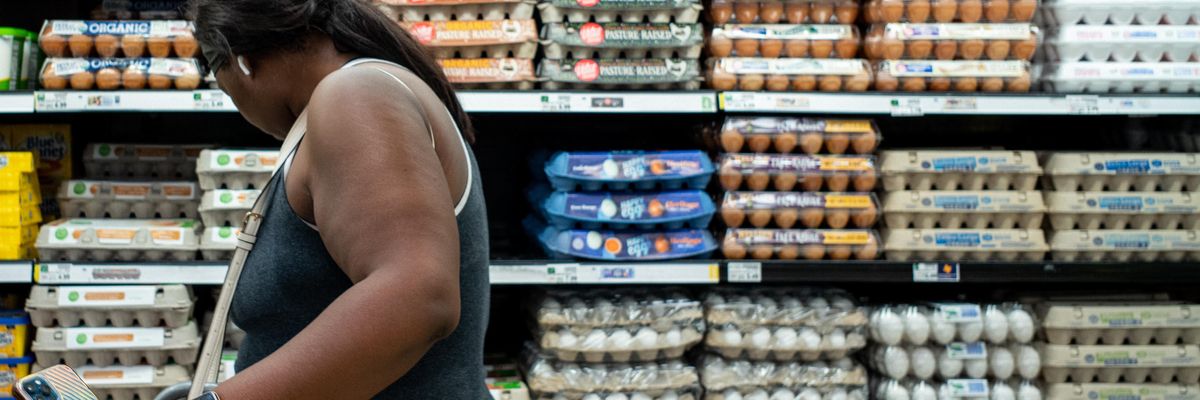A progressive coalition of more than 100 unions and consumer advocacy groups from across the United States has come together to build the "Stop the Merger" campaign, a national and state-level effort to prevent Kroger from acquiring Albertsons and establishing the country's most powerful grocery cartel.
On Tuesday, the coalition announced the launch of NoGroceryMerger.com, which includes information about the negative impacts of the proposed $25 billion merger between two of the nation's largest grocery chains, testimony from unionized grocery workers and elected officials, and tools for people to express their opposition to the potential deal.
Individuals and organizations can sign the coalition's letter to the Federal Trade Commission (FTC), which is currently reviewing the grocery giants' proposal and has the regulatory authority to reject it.
If approved, the merger would likely "lead to store closures, worsen food deserts, increase prices for consumers, and destroy thousands of unionized grocery jobs," the letter warns. "This deal is an antitrust travesty and it must be stopped."
Since the Covid-19 pandemic and Russia's invasion of Ukraine disrupted international supply chains—rendered fragile by decades of neoliberal globalization—Kroger, Albertsons, and other mega-grocers have capitalized on these crises as well as the bird flu outbreak, citing them to justify price hikes that far outpace the increased costs of doing business.
Such price gouging has been exacerbated by preceding rounds of supermarket consolidation, and the coalition warns that if the proposed merger between Kroger and Albertsons goes through, it "will no doubt create a monopoly in the grocery industry."
Less competition, says the coalition, would result in even higher food prices and hundreds of shuttered stores—intensifying unequal access to healthy food. It also threatens to destroy thousands of jobs and hurt the ability of farmers and other suppliers to sell their products.
"It's simple: This merger will be bad for workers, bad for customers, and bad for our communities."
Cincinnati-based Kroger trails only Walmart in grocery sales, while Boise-based Albertsons is the fourth largest grocery chain in the U.S., behind Costco. Together, Kroger and Albertsons, including their numerous subsidiaries, employ more than 700,000 workers at roughly 5,000 retail stores and more than 50 manufacturing facilities across 48 states plus Washington, D.C.
According to the campaign's fact sheet, "If this merger goes through, the resulting company will become the largest supermarket by revenue in the United States with a current national market share of 36% and a combined annual sales of more than $200 billion."
As Michelle Freitas, a United Food and Commercial Workers (UFCW) Local 7 member who works at a Safeway in Gunnison, Colorado, noted: "My town only has two standalone grocery stores. If one closes and we only have one option, it will be a monopoly which means this new grocery company could raise food prices to exorbitant amounts."
"If the prices for essential goods go up, how are people who are lower-income or middle-income going to be able to survive?" she asked. "Many people who work at my store live paycheck to paycheck, including parents with small children and single moms."
Lawanna Archer, a UFCW Local 770 member who works at a Vons in Gardena, California, described the devastation that accompanied a merger between Albertsons and Haggen eight years ago.
"The deal between Albertsons and Haggen in 2015 was really bad for workers," said Archer. "I saw massive layoffs, cars being repossessed, foreclosures, and loss of benefits. I am a single mother and I provide for my daughter and myself. The Kroger and Albertsons merger could possibly impact us in the most harmful way ever."
Christina Robinett, another UFCW Local 770 member who endured that merger and now works at a Vons in Ojai, California, said, "After Haggen went bankrupt and shut down my store, I applied for work at four different stores."
"I wasn't able to get a job for three months and I had to take side jobs as a seamstress and cleaning houses to make ends meet," she said. "That merger caused me a lot of anxiety. No worker should go through this kind of hardship again."
The campaign's website features several videos, including one in which Robert Reich, a professor at the University of California, Berkeley and former U.S. labor secretary, explains how the proposed merger "could send skyrocketing food prices through the stratosphere unless government sees the deal for what it is: a rotten egg."
Soon after the proposed deal was announced in October, Sens. Bernie Sanders (I-Vt.) and Elizabeth Warren (D-Mass.) implored the FTC to block it.
Although consolidation in the grocery sector has, according to the American Economic Liberties Project, "previously been mismanaged by antitrust enforcers," approval of Kroger's buyout of Albertsons—the largest supermarket deal since Supervalu, CVS, and a group of investment firms bought Albertsons for $9.7 billion in 2006—is far from guaranteed.
Federal officials, including FTC Chair Lina Khan and Jonathan Kanter, assistant attorney general of the U.S. Department of Justice's Antitrust Division, have both taken a more hard-nosed approach to mergers following decades of lax enforcement.
The decision before regulators should be easy, the coalition argues.
Its members have "written numerous letters to the FTC and state attorneys general, held meetings with federal and state elected officials and regulators, held press conferences and virtual town halls, attended public events on the merger hosted by government officials, and participated in various local community activities opposing the merger," the coalition said in a statement. "All this activity has helped reveal growing evidence that shows the real motives for the proposed merger: corporate greed at the hands of C-suite executives and the private equity firms that are significant owners of their stock."
"It's simple: This merger will be bad for workers, bad for customers, and bad for our communities," reads the campaign website. "Union grocery workers, consumers, elected officials, and community members are standing together to fight for access to nutritious food, safe shopping experiences, and investment in good jobs in our communities."

